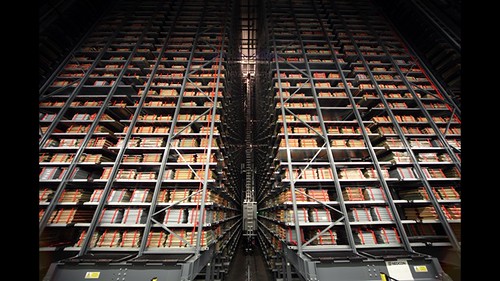
PREV ARTICLE
NEXT ARTICLE
FULL ISSUE
BRITISH LIBRARY DATA SCIENCE PROJECT LAUNCHEDDigitization is only the beginning. Making books, periodicals and other research materials available online is the first step, allowing humans to find and consume individual works. But once digitized, information is freed from the pages and enters a whole new realm where it can be analyzed, enhanced, connected and studied by computers, data scientists and other scientists and researchers of all stripes. The British Library has initiated a project that takes this next step into computer-powered information analysis. Here's an excerpt from a December 19, 2018 press release. -Editor  The Alan Turing Institute and the British Library, together with researchers from a range of universities, have been awarded £9.2 million from the UKRI's Strategic Priorities Fund for a major new project. 'Living with Machines', which will take place over five years, is set to be one of the biggest and most ambitious humanities and science research initiatives ever to launch in the UK. 'Living with Machines' will see data scientists working with curators, historians, geographers and computational linguists with the goal to devise new methods in data science and artificial intelligence that can be applied to historical resources, producing tools and software to analyse digitised collections at scale for the first time. In recognition of the significant changes currently underway in technology, notably in artificial intelligence, the project will use the century following the first Industrial Revolution, and the changes brought about by the advance of technology across all aspects of society during this period as its focus point. Initial research plans involve scientists from The Alan Turing Institute collaborating with curators and researchers to build new software to analyse data drawn initially from millions of pages of out-of-copyright newspaper collections from within the archive in the British Library's National Newspaper Building, and from other digitised historical collections, most notably government collected data, such as the census and registration of births, marriages and deaths. The resulting new research methods will allow computational linguists and historians to track societal and cultural change in new ways during this transformative period in British history. Crucially, these new research methods will place the lives of ordinary people centre-stage, rather than privileging the perspectives of decision-makers and public commentators. 'Living with Machines' will take a radical approach to collaboration, breaking down barriers between academic traditions, bringing together data scientists and software engineers from The Alan Turing Institute and curators from the British Library as well as computational linguists, digital humanities scholars and historians from universities including Exeter, University of East Anglia, Cambridge and Queen Mary University of London. The research methodologies and tools developed as a result of the project will transform how researchers can access and understand digitised historic collections in the future. Adrian Smith, Director of The Alan Turing Institute, commented: "Data science and artificial intelligence have the potential to supercharge the science and humanities. We can analyse vast amounts of data at a huge scale and uncover new insights and questions, as in this timely project with the British Library which will apply data-driven techniques to examine the human, social and cultural impact of the first industrial revolution. It is thrilling to bring together this diverse range of experts to work on this important research problem and deliver tools and techniques which will benefit scholars for generations to come." What does this mean for numismatic researchers? Well, it brings hope that someday these modern techniques will come to the digital stores of numismatic data being amassed by the Newman Numismatic Portal and private firms alike. In the short term, it could mean that new information on British numismatics could be gleaned from the British Library's vast digital stores. -Editor To read the complete article, see: For more information on the Alan Turing Institute, see: To visit the Newman Numismatic Portal, see: Wayne Homren, Editor The Numismatic Bibliomania Society is a non-profit organization promoting numismatic literature. See our web site at coinbooks.org. To submit items for publication in The E-Sylum, write to the Editor at this address: whomren@gmail.com To subscribe go to: https://my.binhost.com/lists/listinfo/esylum All Rights Reserved. NBS Home Page Contact the NBS webmaster 
|